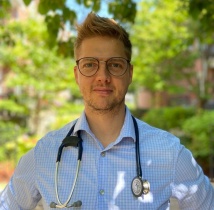Pieter de Jager, FRCPC
Assistant Professor

Email: Pieter.deJager@nshealth.ca
Research Topics:
- Artificial Intelligence and Machine Learning for Dynamic Risk Assessment and Outcome optimization (AIRO project)
- Albumin utilization and associated outcomes in patients undergoing cardiac surgery
- Enhanced recovery after cardiac surgery
- Reducing surgical wait times
- Early extubation after cardiac surgery (BREATHE Trial)
- Regional anesthesia for cardiac surgery (EPOCH Trial)
Administrative Roles
- Member: Department of Anesthesia, Pain Management and Perioperative Medicine CZ Management Committee
Education
- MBChB (University of the Free State)
- MSc Health Economics Policy and Management (London School of Economics)
- MMed Public Health Medicine (University of the Witwatersrand)
- MMed Anesthesiology (University of the Witwatersrand)
- FCPHM (CMSA)
- FCA (CMSA)
- DCH (CMSA)
- DA (CMSA)
- FRCPC (Royal College of Physicians and Surgeons of Canada)
Biography
Dr. Pieter de Jager is a Cardiac Anesthesiologist at QEII Hospital in Halifax, Nova Scotia. He completed a Cardiac Anesthesia and Critical Care fellowship at Toronto General Hospital and a Perioperative Quality Improvement & Patient Safety fellowship at Mount Sinai Hospital, Toronto. He holds an MSc in Health Economics from the London School of Economics and is dual certified in Public Health Medicine and Anesthesiology in South Africa.
Research interests
My research focuses on cardiac anesthesia, with a particular emphasis on Enhanced Recovery After Cardiac Surgery (ERACS) protocols. I am involved in implementing ERACS and conducting research to support future guidelines. Key projects include a randomized controlled trial on parasternal catheters for opioid reduction, a study on albumin use in cardiac surgery, and a national survey and systematic review on in-OR extubation. I am also part of a team developing AI models for dynamic risk assessment for Cardiac Surgery (AIRO project). My goals as a researcher are to advance cardiac anesthesia through evidence-based, multidisciplinary collaboration and translate research into improved clinical care.
